Game Play
- For: 2 to 4 players.
- Ages: 4 years old to adults.
- Warning: Choking hazard Not for children under three years old.
CONTENTS:
Place Holder Cards: GENESIS – EXODUS – LEVITICUS – NUMBERS – DEUTERONOMY. The purpose of the Place Holder Cards is simply a way to represent each of the Five Books of the Bible. These cards have the name of each of the Books of Moses and state “OPEN BOOK” on one side and “CLOSED BOOK” on the other. They are color coded to a question from a specific Book in the Bible Question Cards. There are five sets of each of these cards.
Playing Cards: Consist of 3 different types of cards all mixed in the same deck.
- Number Cards: Numbers 1 to 13. These cards have one or two Hebrew letters in the centre of the card with the name of the letter or letters, which correspond to their numeric values. The numbers are located at the corners of each card. The game consists of five of each number.
- Wild Cards: These cards can be used to represent any number the player desires. There are eight of these cards in the game.
- Change-Up Cards: These cards contain information which adds strategy to the game, such as making other players lose a turn, or to change direction of the game, etc. There are five of these cards in each game.
Bible Question Cards: Each card contains 5 questions, one question from each of the Books of the Bible. The questions are color coded to match with the colors of the Place Holder Cards. There are 100 questions for each of the five books making a total of 500 Bible questions in the game.
One die: Used to determine which player goes first as well as other functions in the game.
SETUP:
Example based on a three-player game:
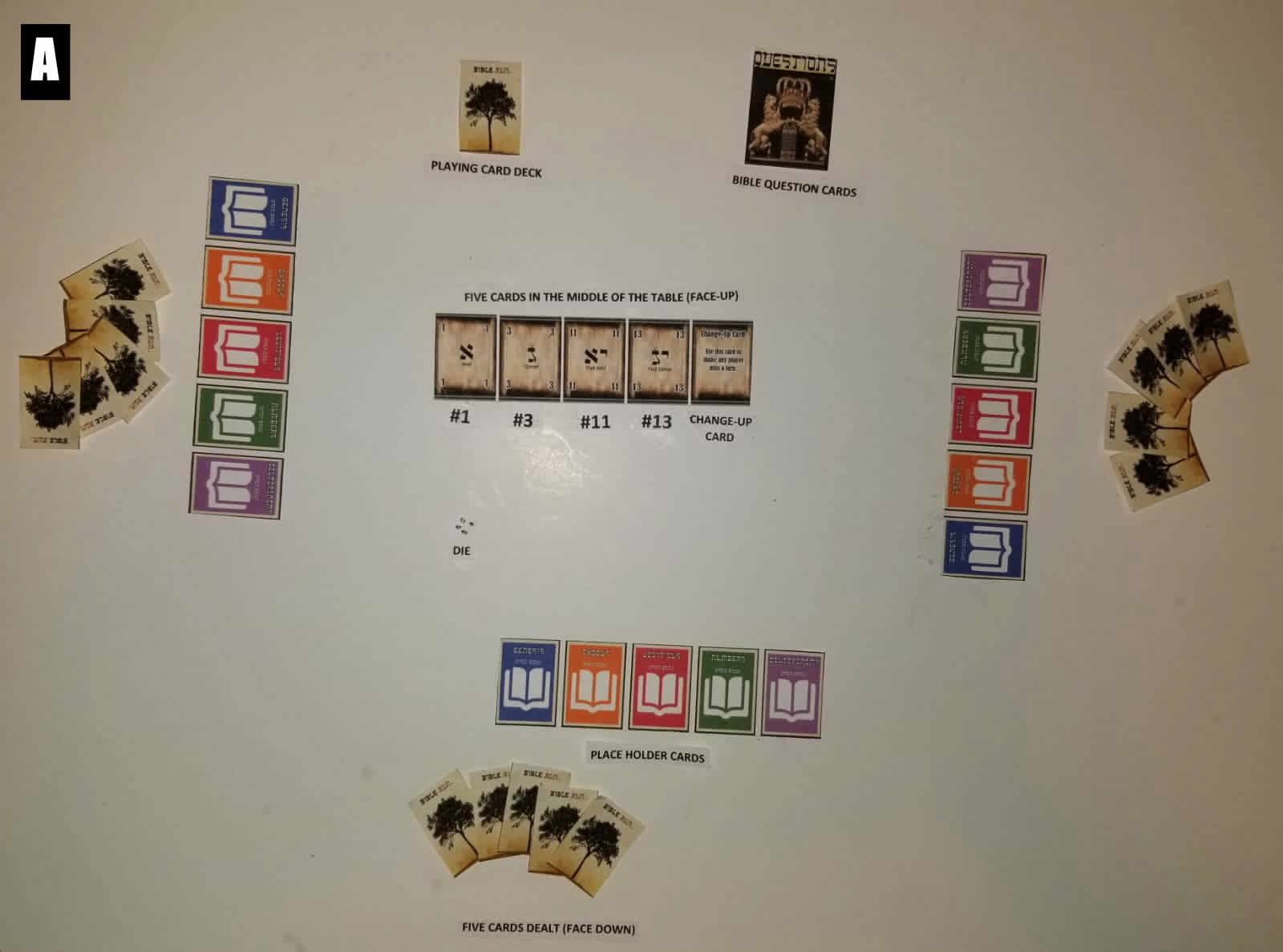
- PLACE HOLDER CARDS: Each player is given a set of Place Holder Cards. The cards remain stationary in front of the players with the “OPEN BOOK” side facing up, in front of each player.
- Each player is dealt 5 Playing Cards from the deck, face down.
- Five Playing Cards from the deck are placed in the middle of the table facing up for all the players to see.
OBJECT:
To answer Bible questions and to use Playing Cards to create runs such as 1,2,3 or 11,12,13 on each of the Place Holder Cards. A player is not obligated to take cards in sequence. This means that a player does not have to obtain a 9, then a 10, and then an 11 in that order. They may, for example, try for a 10, then a 9, and then 11. As long as the player eventually gets a run of 9,10,11 for a particular book, it is considered a run. When a player obtains a run of 3 numbers on a Place Holder Card. The Place Holder Card is flipped over and the book is considered a “CLOSED BOOK”. The first person to “CLOSE” all of the Books of the Bible wins the game. See FAQ section below for variations of how to win, playing time and modifications specifically geared toward players with minimal knowledge of the Bible.
GAME PLAY:
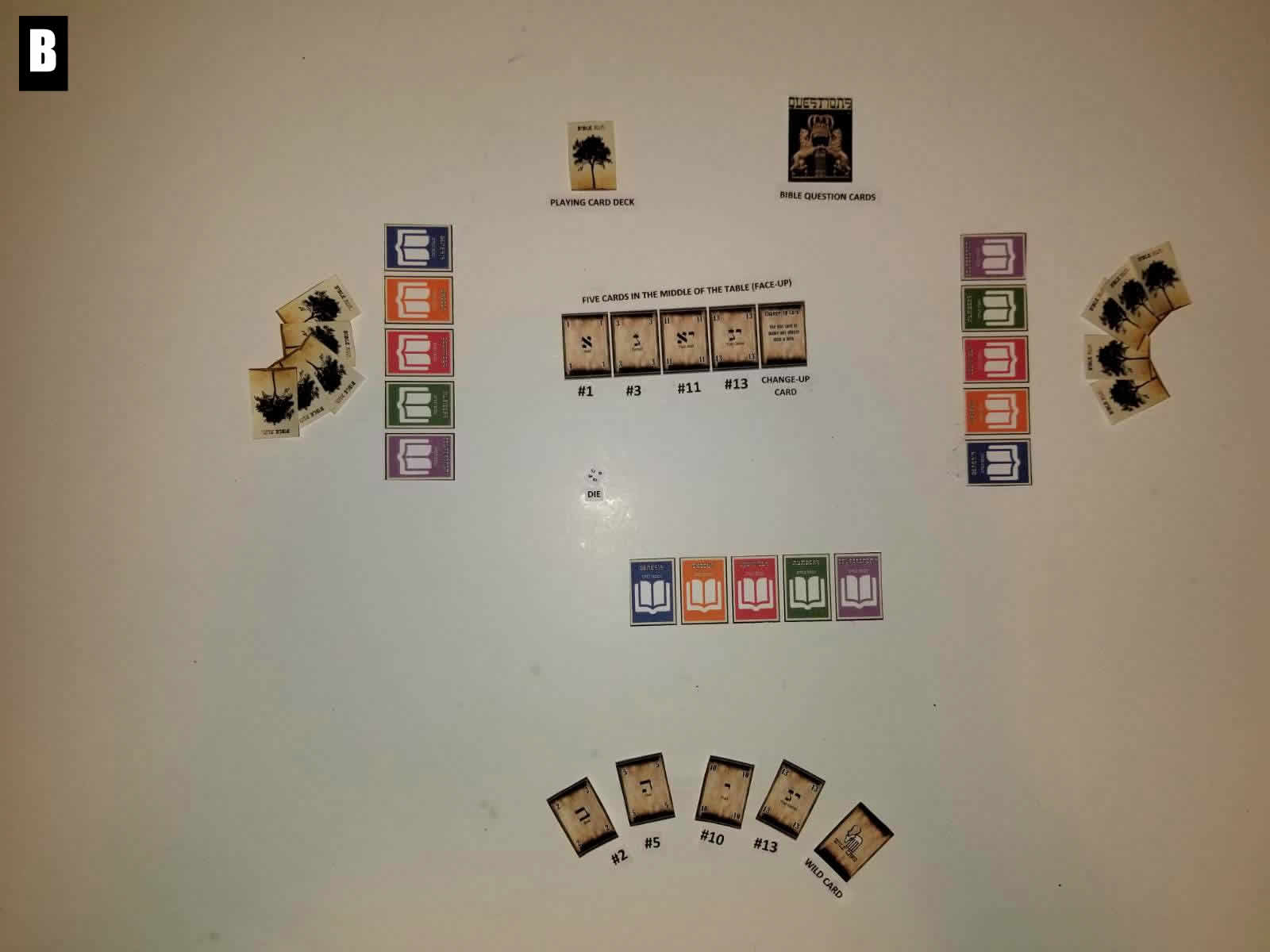
- Cards on the table: 1,3,11,13 and Change-Up Card.
- 5 Playing Cards dealt to first player: 2,5,10,13 and Wild Card.
Three of the cards can be placed on any Place Holder Cards such as:
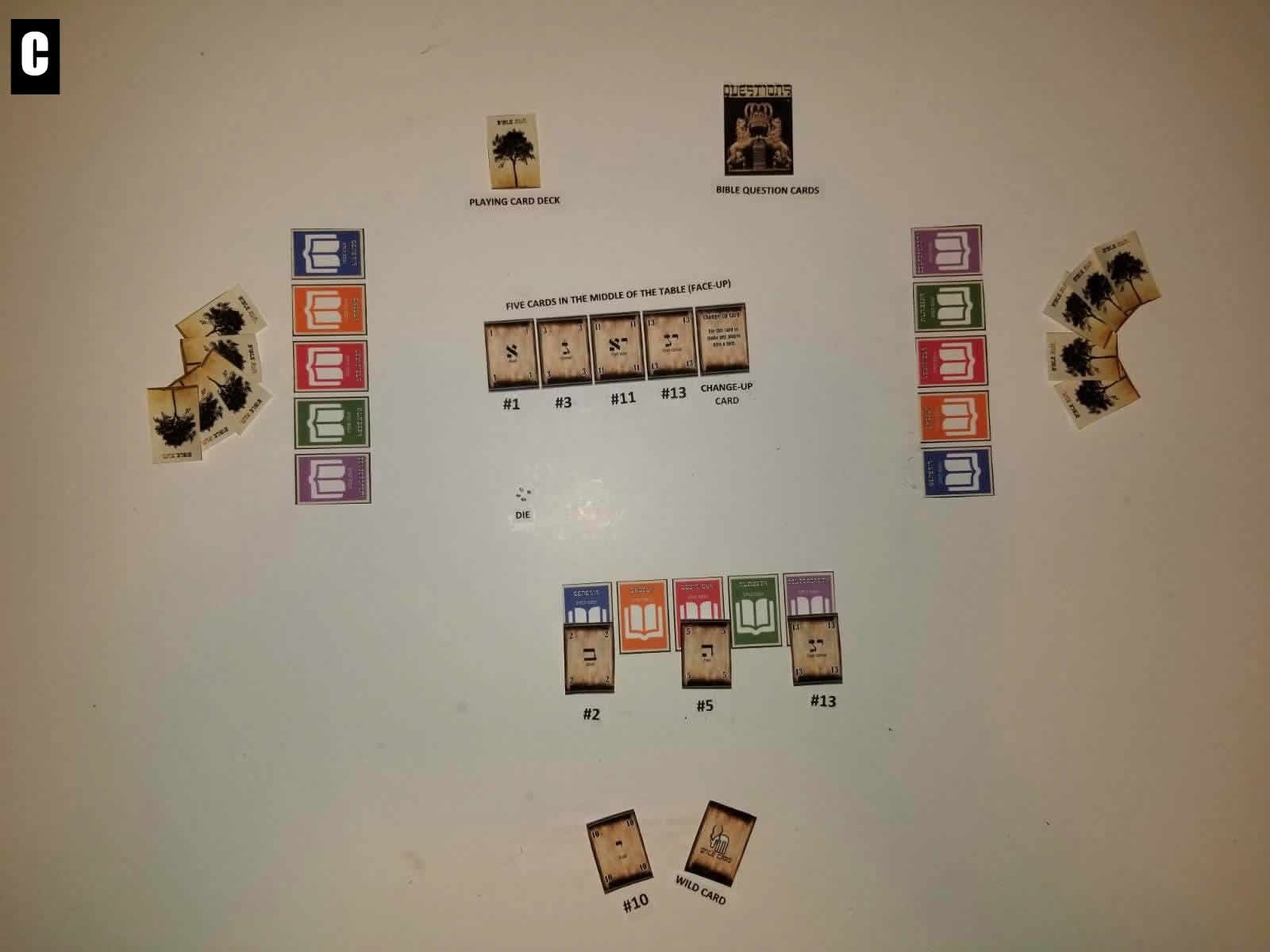
| PLACE HOLDERS | GENESIS | EXODUS | LEVITICUS | NUMBERS | DEUTERONOMY |
| PLAYING CARDS | 2 | 5 | 13 |
The two remaining cards in the player’s hand (10 and Wild Card) is kept for later use in the game. See FAQ section below for information on how to use Change-Up Cards and rules when placing Playing Cards on Place Holder Cards.
Taking turns:
Each player rolls the die. The player who rolls the highest number goes first.
If the player just mentioned is the first person to take a turn, and the 5 cards in the middle of the table are (1,3,11,13 and Change-Up card):
The player can take “one” card from the table. For example: If the player chooses card #1 from the table and Puts it on card #2 (one of the player’s original 5 cards) on GENESIS to eventually get a 3 (2,1,3) to “CLOSE” GENESIS.
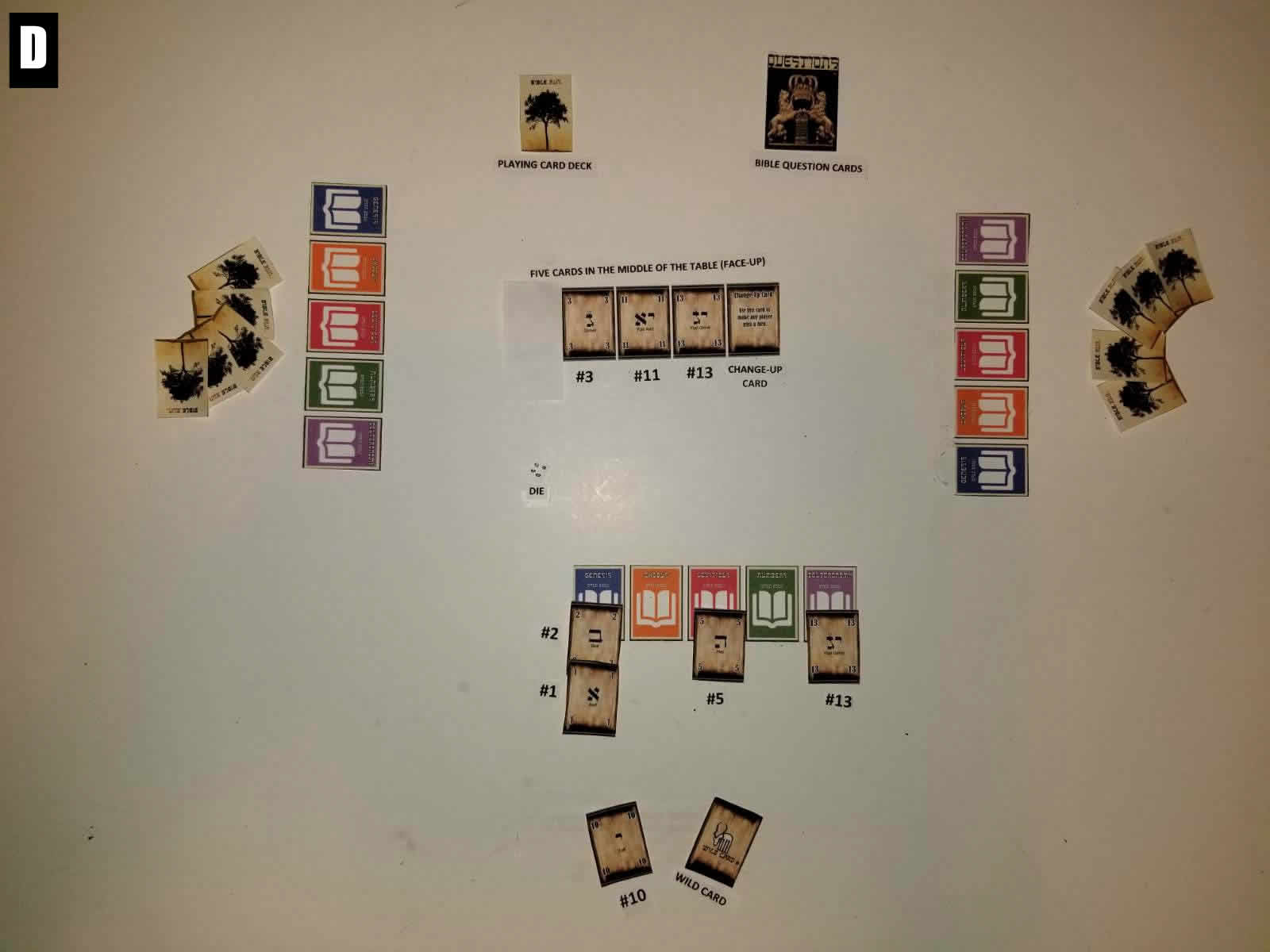
OR
Card #3 and put it on card #5 from LEVITICUS to eventually get a 4 (5,3,4) to “CLOSE” LEVITICUS.
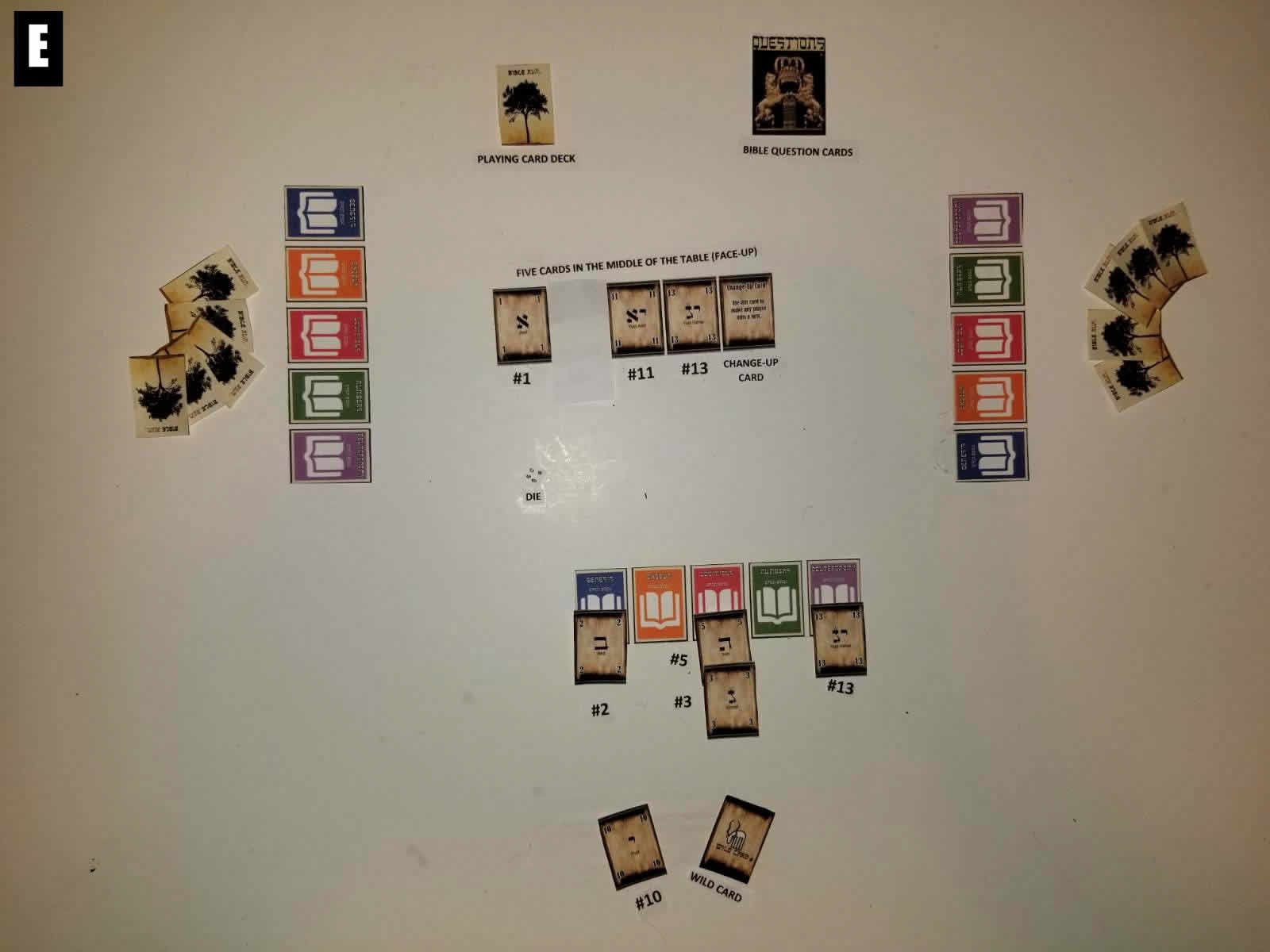
OR
Card #11 and put it on card #13 from DEUTERONOMY to eventually get a 12 (13,11,12) to “CLOSE” DEUTERONOMY.
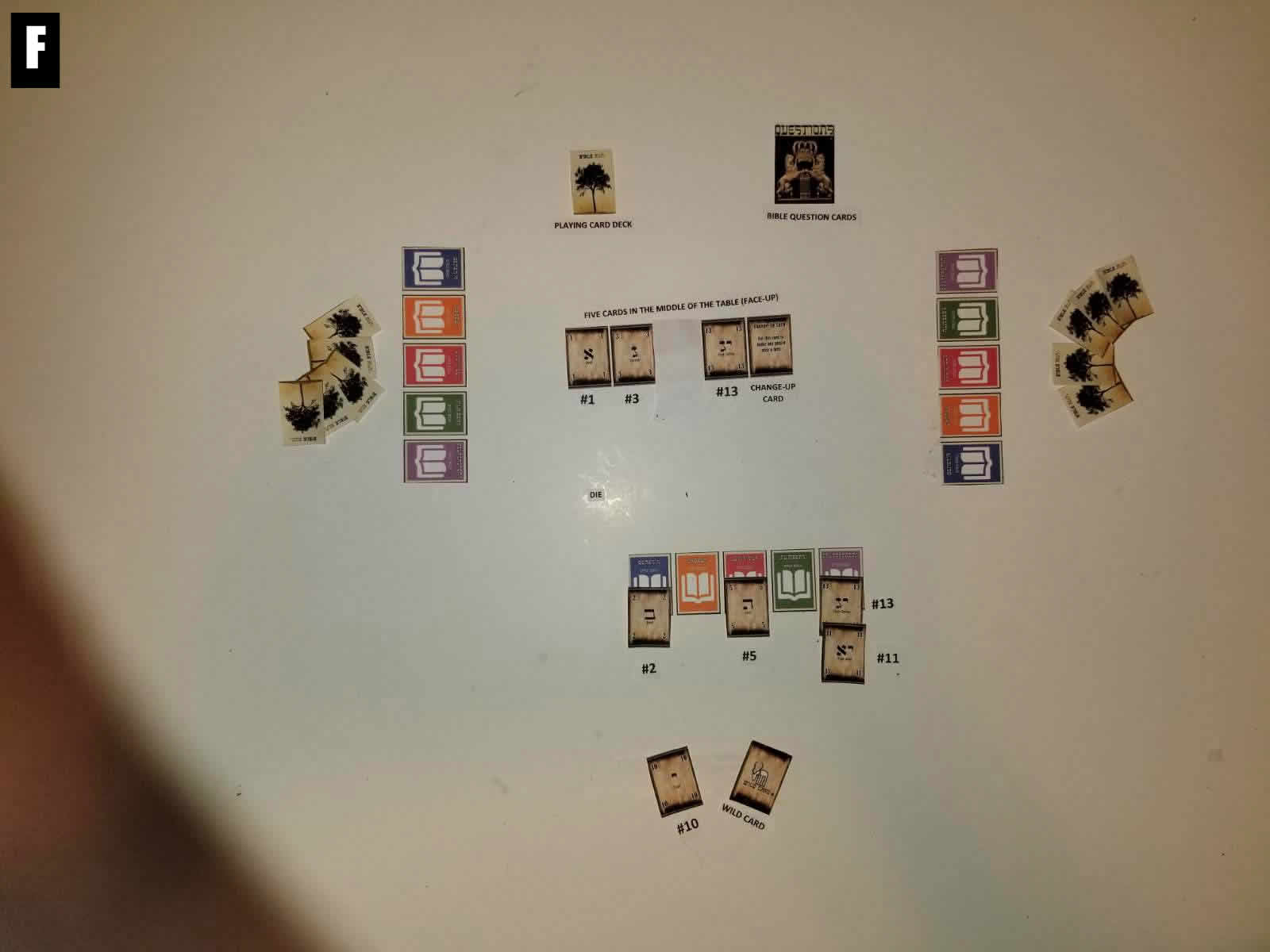
Any number from the table can be used to start a new run on any of the Place Holder Cards.
Note: When placing a Playing Card on a Place Holder Card the card should be a number that can lead to a run. For example: If the player has card #5 on Leviticus; the only cards the player would put on this Place Holder Card is numbers 3,4,6,7 or a Wild Card since these are the only cards that could eventually lead to a run (3,4,5), (4,5 6) or (5,6,7). Remember: the numbers do not need to be in order.
Example of a “CLOSED BOOK”: (13,11,12) on a Deuteronomy Place Holder Card.
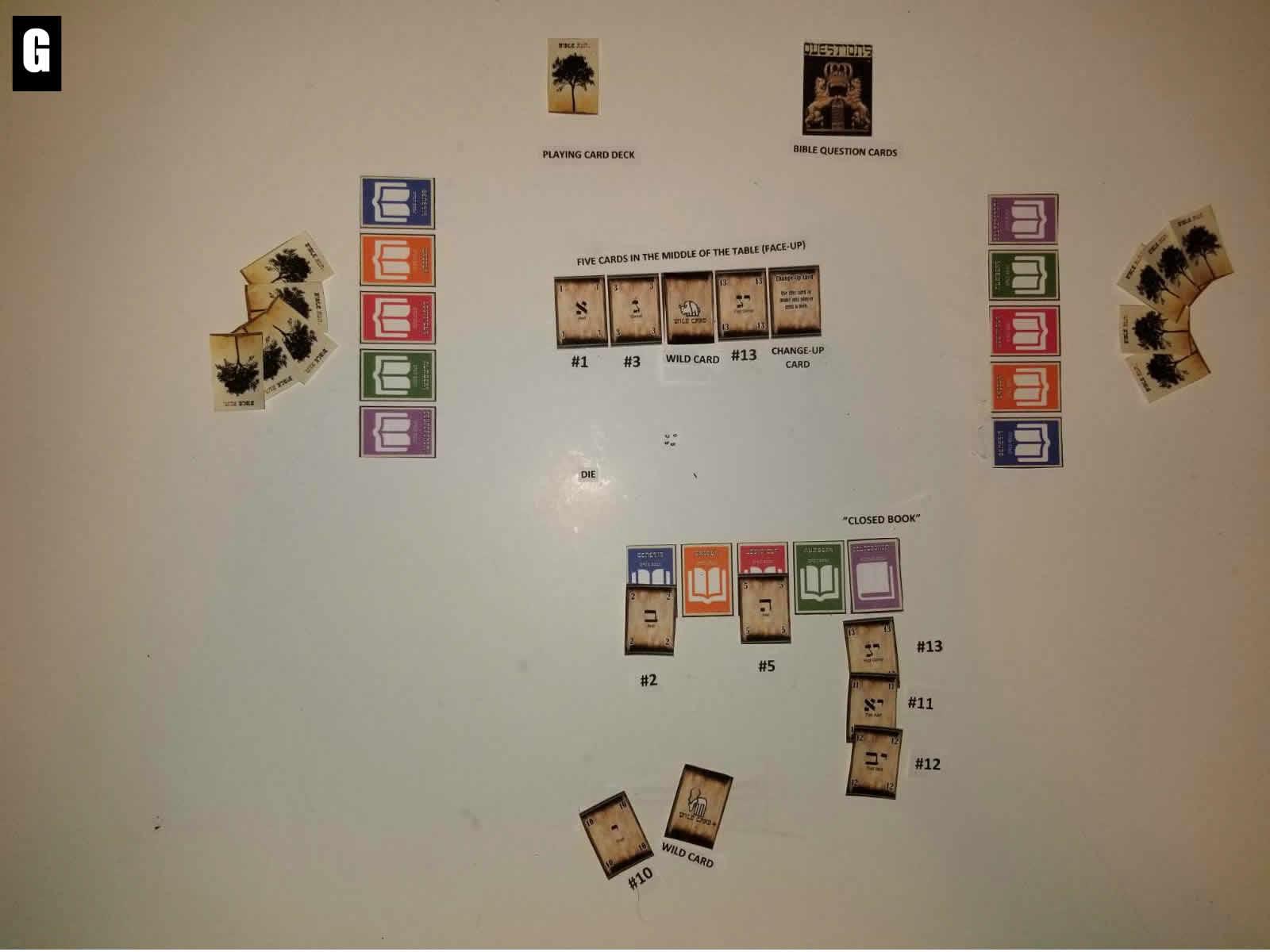
Once a player decides which Playing Card to take from the table and places it on a Place Holder Card, the player is asked a question from the Bible Cards for that “specific” book. For example, if the player above takes card #3 from the table and places it on card #5 (LEVITICUS Place Holder). The player must be asked a LEVITICUS question from the Bible Question Cards.
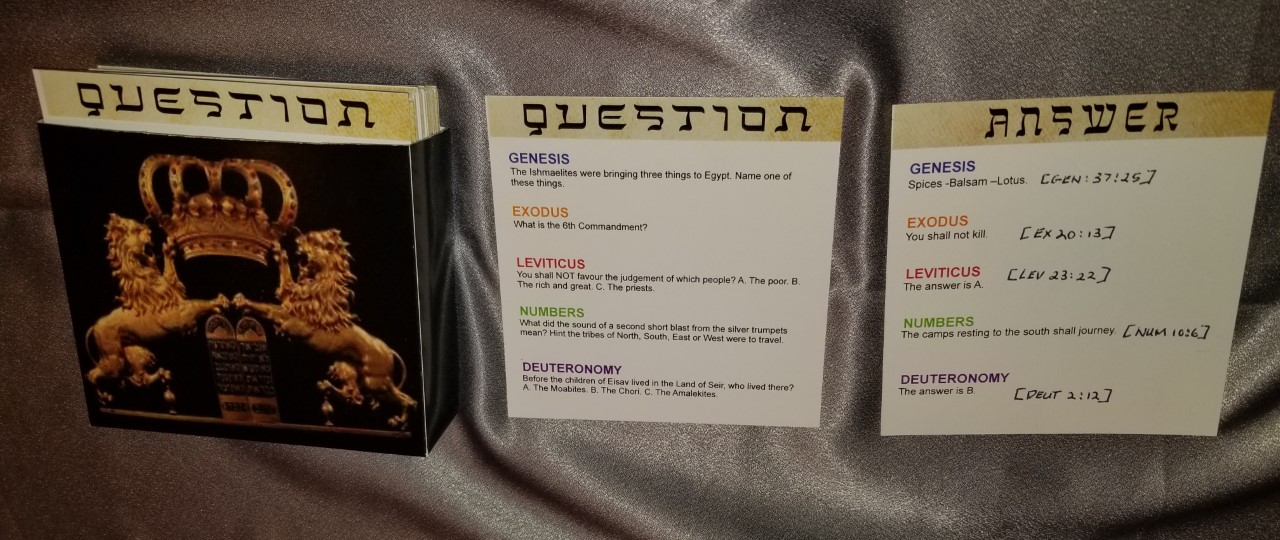
Note: The Bible Question Cards are color coded with the Place Holder Cards to ensure that a player is “ASKED” a Bible question from a specific Book of the Bible. For example, the GENESIS Place Holder Card is the same color as the GENESIS questions from the Bible Question Cards.
If the question is answered correctly, the player keeps the Playing Card and a new card is taken from the deck, so there are always five cards in the middle of the table.
If the question is answered incorrectly, the player must put the Playing Card back in the middle of the table.
Alternatively, on a player’s turn, instead of picking a card from the middle of the table, he or she can use one of the two remaining cards in their hand. However, the player must put this card on one of the Place Holder Cards and answer the question correctly in order to get rid of the card. If the question is answered incorrectly, the player must keep the card until he/she is able to get rid of it on another turn. In order to win the game, the player who “CLOSES” all the books must also get rid of the two cards dealt at the beginning of the game.
After attempting to get a Playing Card, the person’s turn is over and it is the next player’s turn. See FAQ section below for modifications geared toward players with minimal Biblical knowledge.
FAQs:
Variations on how to win and play time:
Play time is based on the number of players in the game. To make the game time shorter, players can agree to change the rules so that the first person to “CLOSE” 1, 2, 3 or 4 books of the Bible wins and the game is ended.
Rules for players with minimal knowledge of the Bible:
Players with minimal knowledge are given hints / multiple choice options at the end of many of the difficult questions. If the player gets the answer correct, the Playing Card is kept. However, if the player gets the answer wrong, he/she will be given the answer (thereby learning about the Bible). To keep the Playing Card the player must roll the die and guess if the number will be low (1 or 2), middle (3 or 4) or high (5 or 6). This gives the player a one-in-three chance of obtaining the Playing Card. Alternatively, for people with no knowledge of the Bible, they can guess low (1,2,3) or High (4,5,6) allowing for a fifty percent chance of obtaining the Playing Card. For young children, the point of the game would be to play the card game (without using Bible questions) as a means to have fun while learning the first 10 letters and 13 numbers of the Hebrew alphabet.
Note: Questions must be asked by any other players to prevent individuals with Biblical knowledge from seeing the hints and multiple choice options intended for those with less Bible knowledge.
Change-Up Cards:
These cards are NOT to be placed on Place Holder Cards. The players can use these cards at any point of the game to make opponents lose a turn, lose cards, re-open books, etc. If a Change-Up Card is one of the 5 cards exposed in the middle of the table, all the players guess a number from 1 to 6 and roll the die. Whoever guesses correctly gets to take the card from the table and keep it for later use. A new card is then pulled from the Playing Card deck so that there are always 5 cards exposed in the middle of the table.
What if none of the Playing Cards in the middle of the table will help me get a run?
On each turn if a player needs a Playing Card from the middle of the table, but cannot use any of them, the cards on the table are replaced with five new cards from the deck. The five cards on the table are continually replaced until the player can get a needed card.
Can the number 1 follow the number 13 in a run?
Players are not permitted to make a run such as 12,13,1.
Can I change my mind after I place a Playing Card on a Place Holder Card?
The 3 Playing Cards (from the initial 5 cards dealt to each player) CANNOT be placed on the same Place Holder Card. Each of the 3 cards must be placed on different Place Holder Cards. A player may NOT move Playing Cards from one Place Holder Card to another. Once a card is placed on a Place Holder Card it is “LOCKED” into its spot and the card may not be moved, unless otherwise decided by a Chang-Up Card.